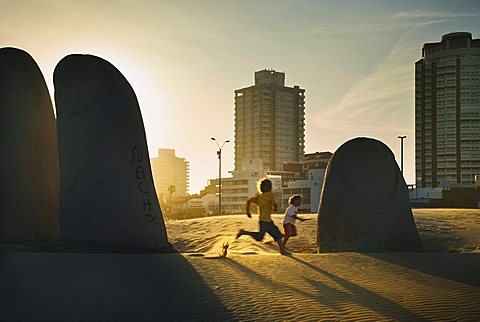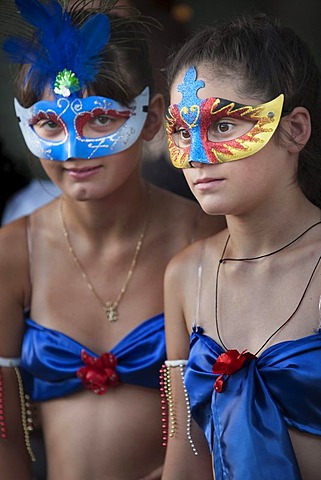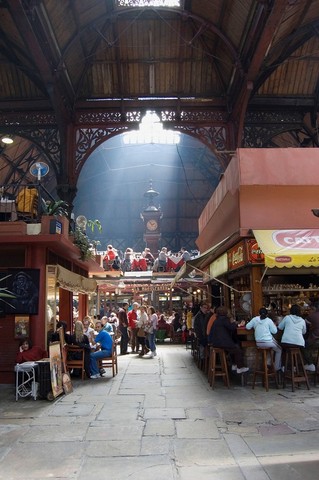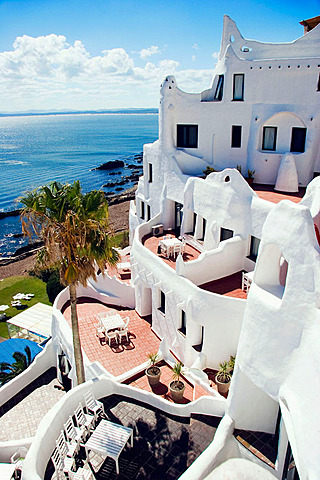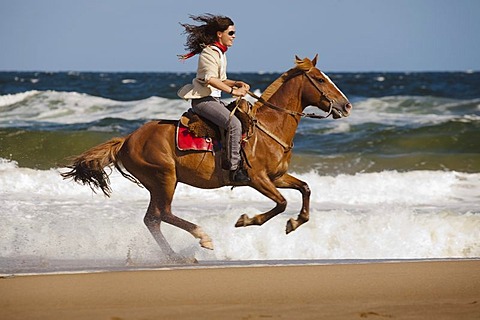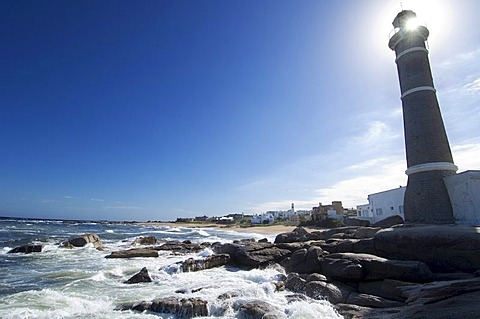Uruguay’s progressive policies have shone a spotlight on this little South American nation over recent years, drawing well-deserved attention to its laid back beauty and abundant tourist attractions too. As it emerges from the shadows of neighbouring giants Brazil or Argentina, visitors are discovering paradise beaches, rustic towns, rich musical traditions and wines to challenge the Malbecs of Mendoza, not to mention some of the friendliest people in South America.
Sculpture of a hand on the beach at Praya Brava with children playing in the evening light, Punta del Este (Robert Harding/Jon Hicks)
A couple of girls wearing masks during Uruguay’s traditional carnival (Robert Harding/Marcos Ferro)
The New Year marks the beginning of the holiday season here, and the longest carnival in the South – running for 40 days from the end of January – is the perfect excuse to visit this laid-back nation while escaping the Northern Hemisphere’s winter. Head to the capital, Montevideo, for Las Llamadas, in which hundreds of costumed drummers parade down the cobbled streets of the traditional Palermo and Barrio Sur neighbourhoods to the thundering, home-grown rhythms of candombe, a legacy left by the slaves who were brought to these shores in colonial times. You can also enjoy a murga performance, featuring choral songs and comedy in one of the city’s open-air theatres.
A man with his face painted playing the drums during the Las Llamadas carnival celebrations (Robert Harding/Marcos Ferro)
Portrait of a girl posing with feathers and colourful dress at the Desfile de las Llamadas (Robert Harding/Marcos Ferro)
While you’re in the capital, sample an asado at the atmospheric Mercado del Puerto, a beautiful cast-iron building buzzing with trade, packed with open-plan parrillas (grills) cooking sizzling steaks, chorizo sausages and morcilla (blood sausage). Then, wile away an afternoon in nearby plazas sipping mate, the bitter tea favoured by Uruguayans that is drunk from a gourd with a metal bombilla (straw).
Mercado del Puerto, Montevideo (Robert Harding/Eduardo Dreizzen)
Mates for sale at a street market, Montevideo (Robert Harding/Ximena Griscti)
Avenida 18 de Julio, Montevideo (Robert Harding/Ken Welsh/age fotostock)
Many visitors to Uruguay head straight to beach resorts like Punta del Este, a classy escape where Argentina’s elite go to socialise, sunbathe and be seen. If Punta seems too developed though, 30km to the east you can find the more exclusive dunes of Jose Ignacio, where the likes of Shakira and Naomi Campbell have been spotted on their holidays. But for a complete escape and to sample the real soul of Uruguay, rent a cabin in the off-the-grid hideaway of Cabo Polonio surrounded by wooden shacks and a seal colony, or head even further east to Fortaleza Santa Teresa’s forest campsite, white sands and mysterious old fortress.
Casapueblo, Punta del Este (Robert Harding/Ximena Griscti)
A woman rides a horse at the beach in Punta del Este (Robert Harding/Marcos Ferro)
The lighthouse at Jose Ignacio (Robert Harding/Andrew Kornylak)
South American fur seal resting, Cabo Polonio (Robert Harding/Daniel Gomez)
To the east, old world charm abounds in Colonia del Sacrimento where vintage cars and horse drawn carts amble down sleepy cobbled streets and plazas. For a better view across the Rio de la Plata, the world’s widest river,towards Buenos Aires, climb the 19th century colonial lighthouse. Reward yourself afterwards with a well deserved visit to one of Colonia’s cosy eateries to try the national dish, chivito, a sandwich packed with beef fillet, bacon or ham, cheese, salad and olives, that will satisfy the most hefty appetite.
Colourful old car (Robert Harding/Steve Outram)
Down the road is Carmelo, a rustic town on the banks of the river, surrounded by gently rolling hills and grassy meadows. This is a relaxing, luxury destination where you can sample Uruguay’s speciality Tannat wines and fine cheeses in beautiful settings like Narbona, a restored, turn of the century farmhouse and winery. Typical of the country’s wine makers, it is a small producer whose products have a personal, hand-made touch. While fame may favour the Malbecs of neighbouring Argentina, Uruguay’s wines, like its towns and beaches, have a soulful charm all of their own.
Rows of wine bottles at winery in Carmelo (Robert Harding/Tom Hopkins)
Enjoying wine at Narbona, Carmelo (Robert Harding/Tom Hopkins)
See more images of Uruguay here


